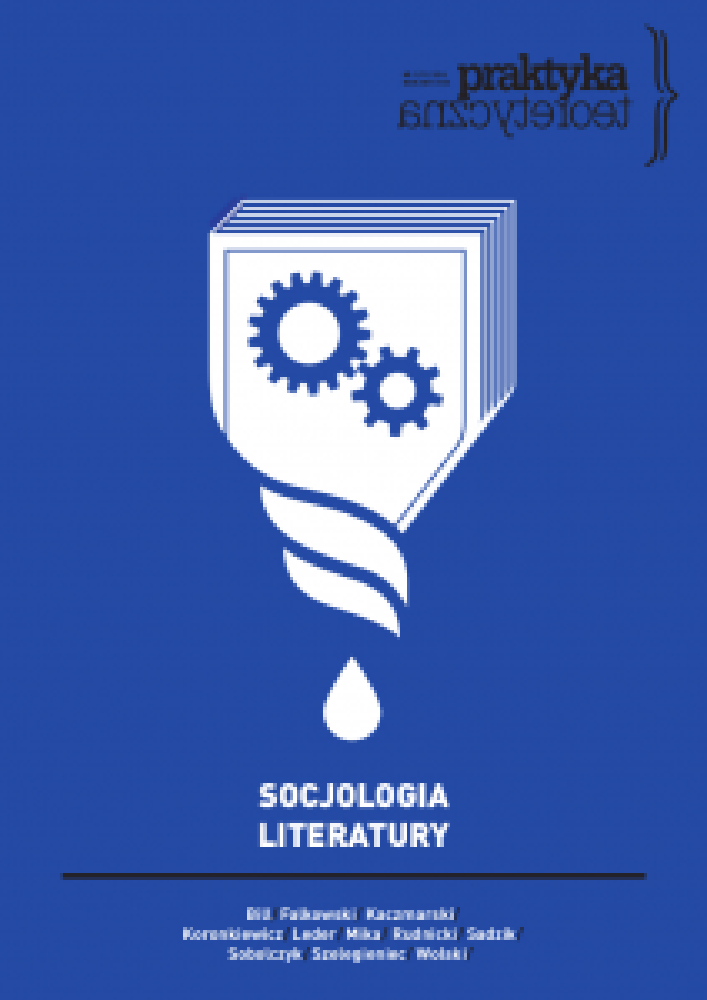Abstrakt
W artykule bronię tezy głoszącej, że nauka o Zagładzie jako dyscyplina wytwarza szczególne napięcie pomiędzy autorem tekstów należących do tej dziedziny (badaczem) i obiektem jego narracji (badań). To napięcie, w pewnym stopniu obecne także w innych dziedzinach humanistycznych pod postacią rewaloryzacji autobiografizmu, narracji somatycznych itp., w przypadku badań nad Zagładą pozostaje w ścisłym związku z zasadniczą modalnością-gatunkiem tego rodzaju pisarstwa – świadectwem – i jego paradoksalnym wymogiem narracyjnego umieszczenia się wewnątrz własnej narracji (obecność zaświadczająca) i pozostawania poza nią (zakładana zdolność narratora do spójnej i bezstronnej opowieści). Próbując udowodnić powszechność tego paradoksu w holocaustowych narracjach historiograficznych, literaturoznawczych i innych, dochodzę do wniosku, że staje się on quasi-gatunkowym wyznacznikiem tej dyscypliny, która opierając się na wspomnianym paradoksie (sygnalizowanym m.in. poprzez proliferację kategorii takich jak np. niewypowiadalność) dąży do ustanowienia własnego badawczego języka i własnej metodologii. Choć jest to często metodologia i terminologia zbieżna z powszechnie stosowanymi narzędziami badań historiograficznych, literaturoznawczych i innych, to w ramach omawianej dziedziny zyskuje ona status narzędzi osobnych, właściwych jedynie dziedzinie Holocaust studies.Bibliografia
Attridge, Derek. 2004. The Singularity of Literature. London: Routledge.
Bauman, Zygmunt. 2003. Razem Osobno. Kraków: Wydawnictwo Literackie.
Berger, Alan. 1982 “Academia and Holocaust”. Judaism 2.
Bernstein, Michael A. 1994 Foregone Conclusions: Against Apocalyptic History. Berkeley: University of California Press.
Culler, Jonathan D. 2007. The Literary in Theory. Stanford, Calif: Stanford University Press.
Danto, Arthur C. 2001. The Body/body Problem: Selected Essays. Berkeley, Calif. Univ. of California Press.
Dawidowicz, Lucy S. The War against the Jews, 1933-1945. New York: Holt, Rinehart and Winston, 1975.
Eaglestone, Robert. 2004. The Holocaust and the Postmodern. Oxford: Oxford University Press.
Eagleton, Terry. 2012. The Event of Literature. Yale University Press.
Engelking, Barbara. 1996. Czas Przestał Dla Mnie Istnieć: Analiza Doświadczania Czasu W Sytuacji Ostatecznej. Warszawa: Wydawn. IFiS PAN
Franklin, Ruth. 2011. A Thousand Darknesses: Lies and Truth in Holocaust Fiction. Oxford: Oxford University Press.
Friedländer, Saul. 1992. Probing the Limits of Representation: Nazism and the „final Solution”. Cambridge: Harvard University Press.
Głowinìski, Michał. 2005. Stosowność i Forma: Jak Opowiadać O Zagładzie? Kraków: Universitas.
Głowiński, Henryk. 1986. Cztery typy fikcji narracyjnej. In: Sławinìski, Janusz. Teoretycznoliterackie Tematy i Problemy. Wroclaw: Zakład Narodowy im. Ossolinìskich, 1986.
Hoffman, Michael J. 1995 „Book Review: Foregone Conclusions: against Apocalyptic History.” Modern Fiction Studies 42.
Hungerford, Amy. 2003. The Holocaust of Texts: Genocide, Literature, and Personification. Chicago: University of Chicago Press.
Lang, Berel. 1990. Act and Idea in the Nazi Genocide. Chicago: University of Chicago Press.
Lang, Berel. 1992. “The Representation of Limits” in Probing the Limits of Representation: Nazism and the „final Solution” edited by Saul Friedländer, Cambridge: Harvard University Press.
Lefkowitz, Lori H. 2001 “Inherited Holocaust Memory and the Ethics of Ventriloquism”, in Shaping Losses: Cultural Memory and the Holocaust, edited by Julia Epstein and Lori H. Lefkovitz, Urbana.
Nancy, Jean-Luc. 1991 The Inoperative Community. Minneapolis, MN: University of Minnesota Press.
Rosenfeld, Alvin H. 1980. A Double Dying: Reflections on Holocaust Literature. Bloomington: Indiana University Press.
Rothberg, Michael. 2009. Multidirectional Memory: Remembering the Holocaust in the Age of Decolonization. Stanford, Calif.: Stanford University Press.
Shallcross, Bożena. 2011. The Holocaust Object in Polish and Polish-Jewish Culture. Bloomington: Indiana University Press.
Siedlecki, Janusz N., Borowski Tadeusz, Olszewski Krystyn. 1946. Byliśmy w Oświęcimiu. Oficyna Warszawska na obczyźnie
Siedlecki, Janusz N., Borowski Tadeusz, Olszewski Krystyn. 2000. We Were in Auschwitz. New York: Rain Publishers.
Simpson, David. 1995. The Academic Postmodern and the Rule of Literature: A Report on Half-knowledge. Chicago: University of Chicago Press.
Sloterdijk, Peter. 2011. Bubbles: Microspherology. Los Angeles: Semiotext(e).
Struk, Janina. 2004. Photographing the Holocaust: Interpretations of the Evidence. London: I.B. Tauris.
Vice, Sue. 2000. Holocaust Fiction. London: Routledge.
Weissman, Gary. 2004 Fantasies of Witnessing: Postwar Efforts to Experience the Holocaust. Ithaca: Cornell University Press, 2004.
White, Hayden. 1992.“Historical Emplotment and the Problem of Truth” in Probing the Limits of Representation: Nazism and the „final Solution” edited by Saul Friedländer, Cambridge: Harvard University Press.
Young, James. 1998. “Holocaust Documentary Fiction. Novelist As Eyewitness.” In: Young, James E. Writing and Rewriting the Holocaust: Narrative and the Consequences of Interpretation. Bloomington u.a: Indiana Univ. Press.
Licencja
Autorzy:
„Praktyka Teoretyczna” jest pismem, które chce realizować idee wolnego dostępu do wiedzy i poszerzania domeny dobra wspólnego. Ma służyć rozwojowi nauki i krytycznej refleksji w Polsce i na świecie w imię idei wolnego dostępu do wiedzy (Open Access). Całe pismo jest udostępniane za darmo w Internecie na warunkach licencji CC-BY-NC-SA (Uznanie autorstwa-Użycie niekomercyjne-Na tych samych warunkach 4.0 Międzynarodowe) w wersji 4.0 (szczegółowe warunki: http://creativecommons.org/licenses/by-nc-sa/4.0/). Artykuły w nim zamieszczone mogą być dowolnie przechowywane, kopiowane, drukowane, rozpowszechniane i wykorzystywane do celów naukowo-dydaktycznych przy zachowaniu warunków licencji. Apelujemy tylko o uznanie autorstwa i podanie źródła w myśl przyjętych w środowisku naukowym standardów.
Nie ma natomiast możliwości komercyjnego wykorzystania zgromadzonych zasobów bez pisemnej zgody wydawcy. Dostęp do czasopisma nie może być dystrybuowany za opłatą czy w jakikolwiek inny sposób limitowany przez inne podmioty.
Autorzy tekstów przyjętych do publikacji w czasopiśmie „Praktyka Teoretyczna” są zobowiązani do wypełnienia, podpisania i odesłania na adres redakcji umowy o udzielenie nieodpłatnej licencji do utworów, z zobowiązaniem do udzielania sublicencji CC [PL.pdf, PL.doc, EN.pdf, EN.doc].
Zgodnie z umową, autorzy tekstów opublikowanych w czasopiśmie „Praktyka Teoretyczna” udzielają wydawcy czasopisma niewyłącznej i nieodpłatnej licencji oraz zezwalają na użycie sublicencji Creative Commons Uznanie autorstwa-Użycie niekomercyjne-Na tych samych warunkach 4.0 Międzynarodowe (CC-BY-NC-SA 4.0).
Autorzy zachowują prawa do dalszego, swobodnego rozporządzania utworem.
Autorzy nadsyłanych artykułów powinni upewnić się, czy wykorzystywane przez nich materiały nie są chronione prawami autorskimi na rzecz innych osób i ponoszą odpowiedzialność za ewentualne uchybienia w tym względzie.
